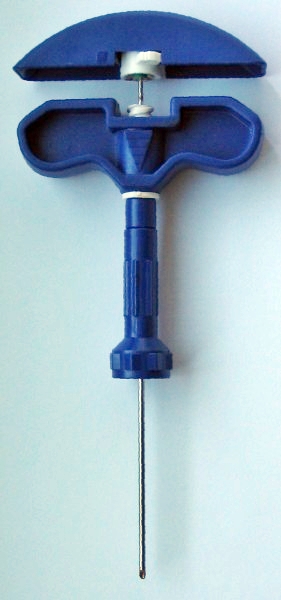Bone marrow examination
(Redirected from Dry tap)
Bone Marrow Examination[edit | edit source]
A bone marrow examination is a diagnostic procedure that involves the extraction and analysis of bone marrow tissue. This procedure is crucial for diagnosing and monitoring various hematological disorders, including leukemia, lymphoma, and anemia.
Types of Bone Marrow Examination[edit | edit source]
Bone marrow examination typically involves two main types of procedures: bone marrow aspiration and bone marrow biopsy.
Bone Marrow Aspiration[edit | edit source]
Bone marrow aspiration involves the removal of a small amount of the liquid portion of the marrow. This procedure is often performed to evaluate the types and numbers of blood cells present in the marrow. It is particularly useful for diagnosing conditions like acute leukemia and aplastic anemia.
Bone Marrow Biopsy[edit | edit source]
A bone marrow biopsy involves the removal of a small, solid piece of bone marrow tissue. This procedure provides information about the architecture of the bone marrow and is essential for diagnosing conditions such as myelofibrosis and metastatic cancer.
Procedure[edit | edit source]
The bone marrow examination is typically performed under local anesthesia. The most common site for the procedure is the posterior iliac crest of the pelvis. The patient is positioned appropriately, and the area is cleaned and anesthetized.
Aspiration Procedure[edit | edit source]
A special needle is inserted into the bone, and a syringe is used to aspirate the liquid marrow. The sample is then placed on slides for microscopic examination.
Biopsy Procedure[edit | edit source]
For a biopsy, a larger needle is used to obtain a core of bone marrow tissue. This sample is processed and examined under a microscope to assess the cellularity and structure of the marrow.
Microscopic Examination[edit | edit source]
The samples obtained from bone marrow aspiration and biopsy are stained and examined under a microscope. The examination focuses on the morphology of the cells, the presence of abnormal cells, and the overall cellularity of the marrow.
Clinical Significance[edit | edit source]
Bone marrow examination is a critical tool in the diagnosis and management of hematological diseases. It helps in:
- Diagnosing blood disorders such as leukemia, lymphoma, and myelodysplastic syndromes.
- Evaluating the effectiveness of treatment for these conditions.
- Investigating unexplained anemia, leukopenia, or thrombocytopenia.
Complications[edit | edit source]
While generally safe, bone marrow examination can have complications such as bleeding, infection, and pain at the biopsy site. These are rare and usually minor.
Related Pages[edit | edit source]
Search WikiMD
Ad.Tired of being Overweight? Try W8MD's physician weight loss program.
Semaglutide (Ozempic / Wegovy and Tirzepatide (Mounjaro / Zepbound) available.
Advertise on WikiMD
|
WikiMD's Wellness Encyclopedia |
| Let Food Be Thy Medicine Medicine Thy Food - Hippocrates |
Translate this page: - East Asian
中文,
日本,
한국어,
South Asian
हिन्दी,
தமிழ்,
తెలుగు,
Urdu,
ಕನ್ನಡ,
Southeast Asian
Indonesian,
Vietnamese,
Thai,
မြန်မာဘာသာ,
বাংলা
European
español,
Deutsch,
français,
Greek,
português do Brasil,
polski,
română,
русский,
Nederlands,
norsk,
svenska,
suomi,
Italian
Middle Eastern & African
عربى,
Turkish,
Persian,
Hebrew,
Afrikaans,
isiZulu,
Kiswahili,
Other
Bulgarian,
Hungarian,
Czech,
Swedish,
മലയാളം,
मराठी,
ਪੰਜਾਬੀ,
ગુજરાતી,
Portuguese,
Ukrainian
Medical Disclaimer: WikiMD is not a substitute for professional medical advice. The information on WikiMD is provided as an information resource only, may be incorrect, outdated or misleading, and is not to be used or relied on for any diagnostic or treatment purposes. Please consult your health care provider before making any healthcare decisions or for guidance about a specific medical condition. WikiMD expressly disclaims responsibility, and shall have no liability, for any damages, loss, injury, or liability whatsoever suffered as a result of your reliance on the information contained in this site. By visiting this site you agree to the foregoing terms and conditions, which may from time to time be changed or supplemented by WikiMD. If you do not agree to the foregoing terms and conditions, you should not enter or use this site. See full disclaimer.
Credits:Most images are courtesy of Wikimedia commons, and templates, categories Wikipedia, licensed under CC BY SA or similar.
Contributors: Prab R. Tumpati, MD




